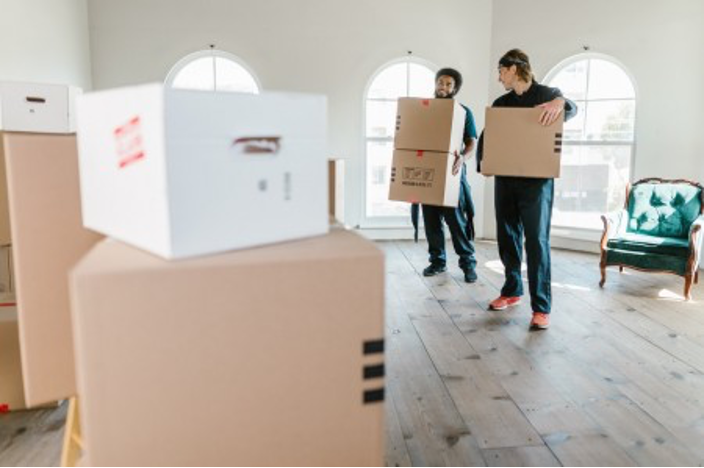

As a renter, there is so much to consider when planning a move. Whether it’s carving out time to pack your clothes and furniture or cleaning your apartment before your landlord’s final walkthrough, it can be easy to get swept away by all of your last-minute moving responsibilities.
Are you currently moving? Looking for some advice on how to best conduct your move? Here are seven tips to help your next move go as smoothly as possible!
 Image via Pexels
Image via Pexels
1. Take Time to Pack Your Belongings: The first important step of moving, especially when you’re renting and need to be out by a certain date, is to take time to pack your belongings. While this is an obvious step to take when preparing for a move, it is nonetheless necessary to ensure that you leave with everything you brought or accumulated over the years. If you have a lot of possessions, be sure to set aside an adequate amount of time to properly sort through, donate/throw away, and pack your belongings. Label boxes or bags for items you plan to donate, toss, and bring with you for easy organization. Once you have sorted through all of your possessions, pack them in storage boxes or buckets and label each for the respective room they belong to, i.e. kitchen, living room, etc. When your items are neatly stored and organized, it makes for a smoother and headache-free move.
2. Plan for the Physical Move: Now that you have your items and belongings packed up, the next important step is to plan for the physical move, i.e. how you’re going to move your belongings from your old rental to your new one. There are several different ways you can go about this, but the most common choices people choose are either hiring professional movers or enlisting the help of friends and family. Whichever you choose, both options have to be thought out in advance and not at the last minute because you could run into trouble finding people available when you need them most. Be sure to line up your move-out/move-in dates and plan accordingly around those when looking for moving helpers. Professional movers are typically on the pricier side, with hourly rates starting around $100. If you don’t have anyone to help or you live in a building that is not mover-friendly, then hiring movers is a good choice. Otherwise, you can ask friends and family to help with moving heavier boxes or bulky furniture, or perhaps even get lucky in borrowing a truck or van that can tote a lot of your belongings.
3. Contact Utility Companies: In the midst of packing, dealing with moving your belongings and the other common stressors of moving, it can be easy to forget the necessary, small things to do such as contacting your utility companies. Before you move from your current apartment, be sure to turn off or cancel your current utilities such as electricity, water, trash, cable/internet, gas, etc. You don’t want to be charged for two residences when you’re only living in one! Similarly, right before you move into your new rental, you want to set up your utilities, such as electricity and water. Not all of your utilities need to be set up right away, but you’ll want the important ones set up as soon as possible to make sure your apartment is ready to be functional.
4. Thoroughly Clean Your Apartment: When renting an apartment, you always want to make sure that you are keeping the place clean and free of any extensive damage, not only for your own peace of mind, but your landlord’s as well. As you prepare to leave your current apartment and move into a new one, do a throughout cleaning of the entire place to ensure you’re leaving it just as it was when you first moved in. Vacuum the carpets, sweep and mop the floors, wipe down countertops, cabinets, windows, and appliances, and overall, make it look nice. The same applies to when you move into your new apartment- don’t assume that the renters before you did a thorough cleaning as they left.
5. Get in Touch with Your Landlord: As you are taking the steps to move into your new place, get in touch with your current landlord to do a final walkthrough and ensure you get any deposits back. Ask your landlord for a move-out damage checklist. After you get your move-out checklist, you can expect your landlord to inspect your apartment for any external damages or issues that could have been hidden while you were still living there. Additionally, establish whether or not your landlord will need his/her keys back, and if so, arrange a date and time to drop off your keys as you are moving out.
6. Explore Your New Neighborhood: When moving to a new area, exploring your new neighborhood is a must. Of course, you’ve done your research and looked into the area prior to your move, but actually exploring your new neighborhood can not only familiarize you with the new place you’re settling into, but it can also give you a feeling of home. Make note of popular restaurants, coffee shops, groceries, laundromats, retail stores, etc. in the area and familiarize yourself with the roads/streets, public transportation, and landmarks so you can own the town you’re moving to!
7. Look Into Renter’s Insurance: No matter what your rental situation is, you always want to be prepared to protect yourself and your belongings in case an unexpected emergency or situation occurs. Prior to moving into your new apartment, look into getting renters insurance. Typically, insurance from your landlord will cover the building you live in but doesn’t go as far as to protect any of your personal property. Having an extra layer of security when it comes to your valuables is significantly better than potentially replacing precious items in the future.
 Image via Pexels
Image via Pexels
Moving in any regard can be stressful, but when you’re a renter, the situation can become even more complicated and overwhelming. Whether it’s dealing with your landlord or organizing your apartment, moving can go smoothly if you take your time and plan accordingly!



 Equal Housing Opportunity
Equal Housing Opportunity

